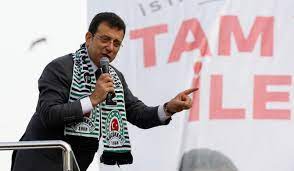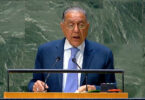ISTANBUL (Reuters): Bruised and fractured by Tayyip Erdogan’s victory in the 2023 general elections, Turkiye’s opposition aims to land a blow in Sunday’s local polls. The outcome is tied to the future of its biggest hope, Istanbul Mayor Ekrem Imamoglu.
The nationwide municipal votes on March 31 could reinforce President Erdogan’s control after two decades of running Turkiye, or signal change in the NATO members’ deeply divided political landscape.
The results will likely be shaped partly by economic woes driven by rampant inflation and by opposition voters weighing the government’s performance and hopes for political change.
Opposition hopes of transformation were fueled by local election results 2019 when they defeated Erdogan’s AK Party in the main two cities, Istanbul and Ankara, which the AKP and its predecessors had run for 25 years.
But Erdogan bounced back last year, retaining the presidency and winning a parliamentary majority with nationalist allies despite voters’ concerns about a cost-of-living crisis. In response, a broad opposition alliance splintered.
Polls show Imamoglu and the AKP candidate, former minister Murat Kurum, in a close race in Istanbul, a city of 16 million, where Erdogan became mayor in the 1990s.
The incumbent opposition mayor leads in the capital, Ankara.
Erdogan has been seeking a bigger role for Turkiye on the world stage and sought to repair frayed ties with many nations in recent years, including in the Middle East.
However, during campaigning, he said Turks should vote for the AKP to defend against unspecified enemies.
“Those who cannot stomach Turkiye’s increasing power in the region and world, or its principled and fair stance, are currently waiting in ambush,” he said on Monday at a rally in the northern province of Tokat.
“In 2019, when Erdogan and the AK Party lost Istanbul, it was a big blow and a scratch on Erdogan’s reputation. Up until then, he was unbeatable, invincible,” said Yetkin Report analyst Murat Yetkin, describing a win in Istanbul as vital for Erdogan.
“If he does so, that means that he will be able to extend and endorse his power to local administrations,” he said. Analysts say Erdogan may then bid to change the constitution to enable him to stand as president again in 2028.
An Imamoglu victory would, however, revitalize the opposition, said political analyst Berk Esen of Sabanci University.
“If the opposition candidate can win in Istanbul, then at least the main opposition party will be able to gain sufficient strength to challenge Erdogan in the coming years,” he said.
It was a message that Imamoglu sought to convey.
“Turkiye’s destiny is in your hands,” Imamoglu said in an appeal to young Turks in Istanbul.
“You can change what is going wrong in Turkiye with one vote.”
Erdogan’s prospects of winning back Istanbul may also depend on Kurdish voters, many of whom, according to pollsters, are expected to put aside party loyalty and back Imamoglu.
For other voters, the local elections offer an opportunity to judge the government’s economic performance.
While the economy may be a key factor influencing voters nationwide, the focus of attention will be on Istanbul and the message it gives on the direction that Turkiye is taking.
“If he loses this election, the legend of Ekrem Imamoglu will be in great trouble,” said MAK Research head Mehmet Ali Kulat. But his victory will change the picture.







